高级法学英语1-3
- 格式:doc
- 大小:206.00 KB
- 文档页数:65
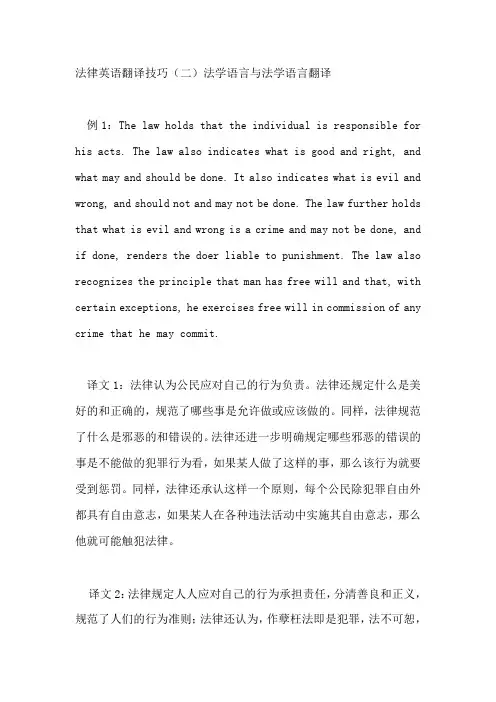
法律英语翻译技巧(二)法学语言与法学语言翻译例1:The law holds that the individual is responsible for his acts. The law also indicates what is good and right, and what may and should be done. It also indicates what is evil and wrong, and should not and may not be done. The law further holds that what is evil and wrong is a crime and may not be done, and if done, renders the doer liable to punishment. The law also recognizes the principle that man has free will and that, with certain exceptions, he exercises free will in commission of any crime that he may commit.译文1:法律认为公民应对自己的行为负责。
法律还规定什么是美好的和正确的,规范了哪些事是允许做或应该做的。
同样,法律规范了什么是邪恶的和错误的。
法律还进一步明确规定哪些邪恶的错误的事是不能做的犯罪行为看,如果某人做了这样的事,那么该行为就要受到惩罚。
同样,法律还承认这样一个原则,每个公民除犯罪自由外都具有自由意志,如果某人在各种违法活动中实施其自由意志,那么他就可能触犯法律。
译文2:法律规定人人应对自己的行为承担责任,分清善良和正义,规范了人们的行为准则;法律还认为,作孽枉法即是犯罪,法不可恕,谁要以身试法,必将受到严惩。
法律所主张的原则是:人人享有自由意志的权利;同时也认为,除特殊情况外,人们的自由往往表现在因泛滥自由意志而受到惩罚的行为上。
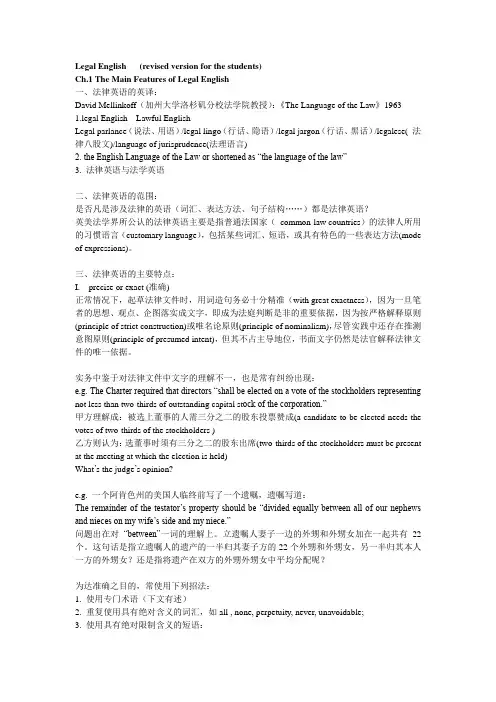
Legal English (revised version for the students)Ch.1 The Main Features of Legal English一、法律英语的英译:David Mellinkoff(加州大学洛杉矶分校法学院教授):《The Language of the Law》19631.legal English---Lawful EnglishLegal parlance(说法、用语)/legal lingo(行话、隐语)/legal jargon(行话、黑话)/legalese( 法律八股文)/language of jurisprudence(法理语言)2. the English Language of the Law or shortened as “the language of the law”3. 法律英语与法学英语二、法律英语的范围:是否凡是涉及法律的英语(词汇、表达方法、句子结构……)都是法律英语?英美法学界所公认的法律英语主要是指普通法国家(common-law countries)的法律人所用的习惯语言(customary language),包括某些词汇、短语,或具有特色的一些表达方法(mode of expressions)。
三、法律英语的主要特点:I. precise or exact (准确)正常情况下,起草法律文件时,用词造句务必十分精准(with great exactness),因为一旦笔者的思想、观点、企图落实成文字,即成为法庭判断是非的重要依据,因为按严格解释原则(principle of strict construction)或唯名论原则(principle of nominalism),尽管实践中还存在推测意图原则(principle of presumed intent),但其不占主导地位,书面文字仍然是法官解释法律文件的唯一依据。
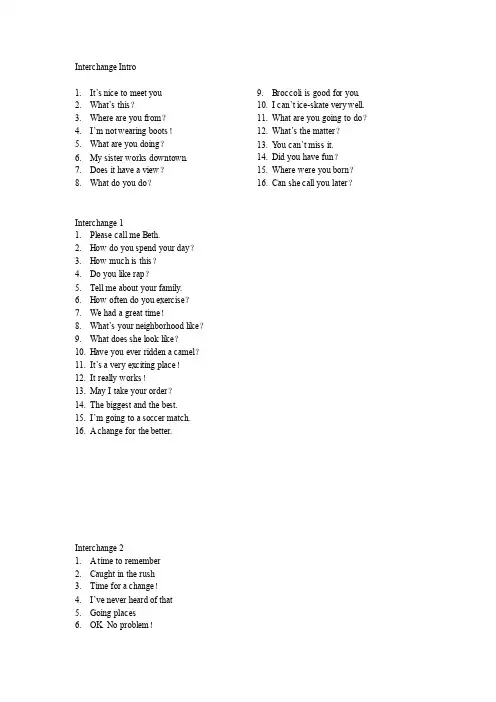
Interchange Intro1.It’s nice to meet you2.What’s this?3.Where are you from?4.I’m not wearing boots!5.What are you doing?6.My sister works downtown.7.Does it have a view?8.What do you do?9.Broccoli is good for you.10.I can’t ice-skate very well.11.What are you going to do?12.What’s the matter?13.Y ou can’t miss it.14.Did you have fun?15.Where were you born?16.Can she call you later?Interchange 11.Please call me Beth.2.How do you spend your day?3.How much is this?4.Do you like rap?5.Tell me about your family.6.How often do you exercise?7.We had a great time!8.What’s your neighborhood like?9.What does she look like?10.Have you ever ridden a camel?11.It’s a very exciting place!12.It really works!13.May I take your order?14.The biggest and the best.15.I’m going to a soccer match.16.A change for the better.Interchange 21.A time to remember2.Caught in the rush3.Time for a change!4.I’ve never heard of that5.Going places6.OK. No problem!7.What’s this for?8.Let’s celebrate!9.Back to the future10.I don’t like working on weekends!11.It’s really worth seeing!12.It could happen to you.13.Good book, terrible movie!14.So that’s what it means!15.What would you do?What’s your excuse?下面是三个励志小故事,不需要的朋友可以下载后编辑删除谢谢!!!你可以哭泣,但不要忘了奔跑2012年,我背着大包小包踏上了去往北京的火车,开启了北漂生涯。
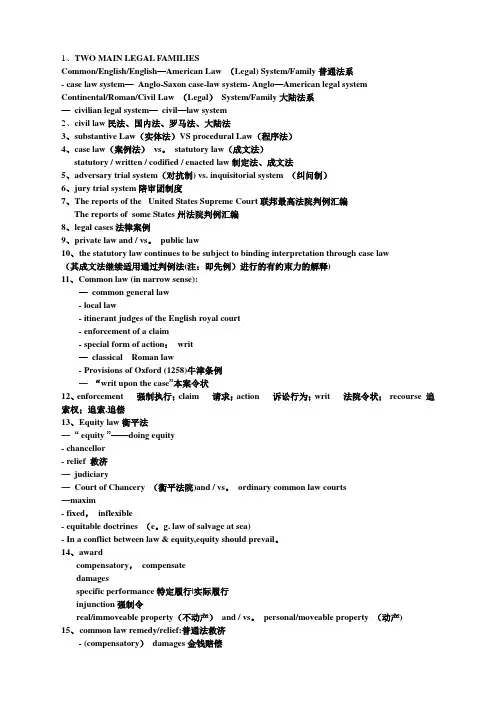
1、TWO MAIN LEGAL FAMILIESCommon/English/English—American Law (Legal) System/Family普通法系- case law system—Anglo-Saxon case-law system- Anglo—American legal systemContinental/Roman/Civil Law (Legal)System/Family大陆法系—civilian legal system—civil—law system2、civil law民法、国内法、罗马法、大陆法3、substantive Law(实体法)VS procedural Law(程序法)4、case law(案例法)vs。
statutory law(成文法)statutory / written / codified / enacted law制定法、成文法5、adversary trial system(对抗制) vs. inquisitorial system (纠问制)6、jury trial system陪审团制度7、The reports of the United States Supreme Court联邦最高法院判例汇编The reports of some States州法院判例汇编8、legal cases法律案例9、private law and / vs。
public law10、the statutory law continues to be subject to binding interpretation through case law(其成文法继续适用通过判例法(注:即先例)进行的有约束力的解释)11、Common law (in narrow sense):—common general law- local law- itinerant judges of the English royal court- enforcement of a claim- special form of action:writ—classical Roman law- Provisions of Oxford (1258)牛津条例—“writ upon the case”本案令状12、enforcement 强制执行;claim 请求;action 诉讼行为;writ 法院令状;recourse 追索权;追索,追偿13、Equity law衡平法—“ equity ”——doing equity- chancellor- relief 救济—judiciary—Court of Chancery (衡平法院)and / vs。
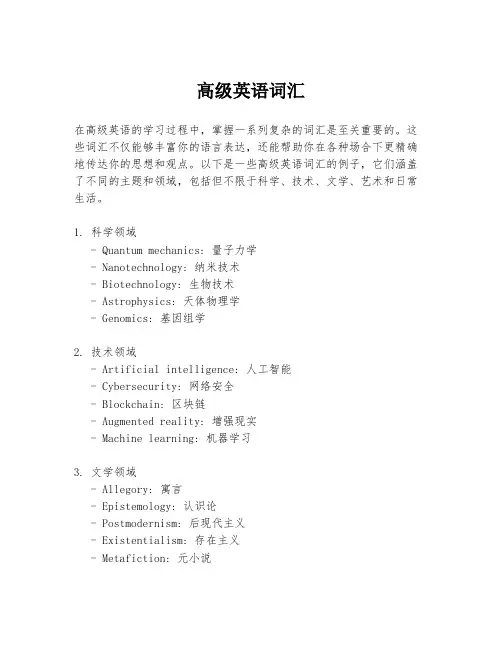
高级英语词汇在高级英语的学习过程中,掌握一系列复杂的词汇是至关重要的。
这些词汇不仅能够丰富你的语言表达,还能帮助你在各种场合下更精确地传达你的思想和观点。
以下是一些高级英语词汇的例子,它们涵盖了不同的主题和领域,包括但不限于科学、技术、文学、艺术和日常生活。
1. 科学领域- Quantum mechanics: 量子力学- Nanotechnology: 纳米技术- Biotechnology: 生物技术- Astrophysics: 天体物理学- Genomics: 基因组学2. 技术领域- Artificial intelligence: 人工智能- Cybersecurity: 网络安全- Blockchain: 区块链- Augmented reality: 增强现实- Machine learning: 机器学习3. 文学领域- Allegory: 寓言- Epistemology: 认识论- Postmodernism: 后现代主义- Existentialism: 存在主义- Metafiction: 元小说4. 艺术领域- Aesthetics: 美学- Baroque: 巴洛克风格- Cubism: 立体主义- Impressionism: 印象派- Surrealism: 超现实主义5. 日常生活- Ambiguity: 模糊不清- Serendipity: 意外发现- Ineffable: 难以言喻的- Ephemeral: 短暂的- Paradox: 悖论6. 经济领域- Inflation: 通货膨胀- Deflation: 通货紧缩- Fiscal policy: 财政政策- Monopolistic competition: 垄断竞争 - Subsidies: 补贴7. 法律领域- Jurisprudence: 法学- Tort: 侵权行为- Litigation: 诉讼- Precedent: 先例- Statute: 法规8. 心理学领域- Cognitive dissonance: 认知失调- Empathy: 同理心- Neurosis: 神经症- Phobia: 恐惧症- Psychoanalysis: 精神分析9. 环境科学- Biodiversity: 生物多样性- Ecosystem: 生态系统- Sustainability: 可持续性- Deforestation: 森林砍伐- Global warming: 全球变暖10. 社会政治- Democracy: 民主- Socialism: 社会主义- Anarchy: 无政府状态- Pluralism: 多元主义- Human rights: 人权这些词汇只是高级英语词汇的一小部分,但它们可以作为你扩展词汇量和提高语言能力的起点。

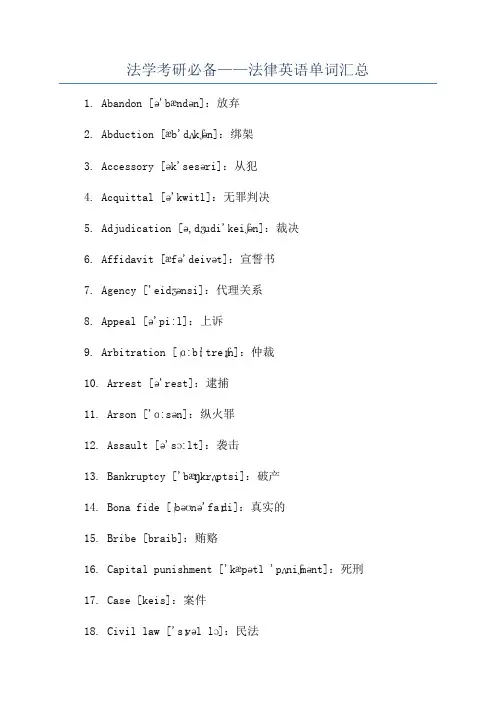
法学考研必备——法律英语单词汇总1. Abandon [ə'bændən]:放弃2. Abduction [æb'dʌkʃən]:绑架3. Accessory [ək'sesəri]:从犯4. Acquittal [ə'kwitl]:无罪判决5. Adjudication [ə,dʒudi'keiʃən]:裁决6. Affidavit [æfə'deivət]:宣誓书7. Agency ['eidʒənsi]:代理关系8. Appeal [ə'pi:l]:上诉9. Arbitration [ˌɑ:bɪ'treɪʃn]:仲裁10. Arrest [ə'rest]:逮捕11. Arson ['ɑ:sən]:纵火罪12. Assault [ə'sɔ:lt]:袭击13. Bankruptcy ['bæŋkrʌptsi]:破产14. Bona fide [ˌbəʊnə'faɪdi]:真实的15. Bribe [braib]:贿赂16. Capital punishment ['kæpətl 'pʌniʃmənt]:死刑17. Case [keis]:案件18. Civil law ['sɪvəl lɔ]:民法19. Claim [kleim]:要求20. Class action [klæs 'ækʃən]:集体诉讼23. Confidential ['kɔnfɪ'denʃl]:机密的24. Consent [kən'sent]:同意25. Consideration [kənˌsɪdə'reɪʃən]:对价26. Constitution [ˌkɔnstɪ'tʊʃən]:宪法27. Contract ['kɔntrækt]:合同28. Contrary ['kɔntrəri]:相反的29. Conviction [kən'vikʃən]:定罪30. Corroborating [kə'rɔbəreitiŋ]:证实的31. Court ['kɔ:rt]:法院32. Crime [kraim]:犯罪33. Criminal ['krɪmɪnəl]:犯罪的34. Damages ['dæmidʒiz]:损害赔偿35. Defendant [di'fendənt]:被告36. Defense [di'fens]:辩护37. Deposition [,depə'ziʃən]:证词38. Detention [dɪ'tenʃən]:拘留39. Disbarment [dɪs'bɑ:rmənt]:取消律师资格40. Discrimination [dɪɪskrɪmə'neɪʃən]:歧视41. Docket ['dɑkɪt]:案卷42. Due process [dju: 'prəʊses]:正当程序43. Eminent domain ['emɪnənt də'mein]:征用44. Enforce [ɪn'fɔ:s]:强制执行45. Evidence ['evɪdəns]:证据46. Extradition [ˌekstrə'dɪʃən]:引渡47. Felony ['feləni]:重罪48. Forfeit ['fɔ:fit]:没收49. Fraud [frɔ:d]:欺诈50. Guilty ['ɡɪlti]:有罪的51. Habeas corpus ['heibiəs 'kɔ:pəs]:人身保护令52. Hearing ['hɪərɪŋ]:听证会53. Immunity [ɪ'mju:nəti]:豁免权54. Indemnify [ɪn'dɛmnəˌfaɪ]:赔偿55. Indictment [ɪn'daɪtmənt]:起诉56. Injunction [ɪn'dʒʌŋkʃən]:禁令57. Judgment ['dʒʌdʒmənt]:判决58. Jurisdiction [,dʒurɪs'dɪkʃən]:管辖权59. Jus primae noctis [dʒʌs praimiː 'nɒktis]:初夜权60. Jury ['dʒʊəri]:陪审团61. Justice ['dʒʌstɪs]:公正62. Law ['lɔ:]:法律63. Lien ['li:ən]:留置权64. Litigation [ˌlɪtɪ'ɡeɪʃən]:诉讼65. Malfeasance [mæl'fi:zns]:渎职66. Manslaughter ['mænˌslɔ:tər]:过失杀人67. Negligence ['neɡlɪdʒəns]:过失68. Oath [əʊθ]:誓言69. Objection [əb'dʒekʃən]:异议70. Offender [ə'fendər]:犯罪者71. Ordinance ['ɔ:rdinəns]:法规72. Parole [pə'roʊl]:假释73. Pardon ['pɑrdn]:赦免74. Perjury ['pɜrdʒəri]:伪证罪75. Petit jury [ˈpɛti dʒʊəri]:陪审团76. Plaintiff ['pleɪntɪf]:原告77. Plea [pli:]:答辩78. Precedent ['prisɪdənt]:先例79. Preliminary [priː'limɪneri]:初步的80. Probate ['probeit]:遗嘱认证81. Pro bono ['proʊˈboʊnoʊ]:免费的82. Prosecutor ['prɑsɪˌkjuːtər]:检察官83. Racketeering [ˌrækɪ'tiəriŋ]:敲诈勒索84. Rape [reɪp]:强奸85. Rebuttal [ri'bʌtl]:反驳86. Reasonable ['riznəbl]:合理的87. Rebuttable [rɪ'bʌtəbəl]:可辩驳的88. Sentence ['sen(t)əns]:判决89. Smuggling ['smʌɡlɪŋ]:走私90. Statute ['stæčut]:法令91. Subpoena [sə'pinə]:传票92. Summons ['sʌmənz]:传票93. Testimony ['testə'məʊnɪ]:证词94. Tort [tɔːrt]:侵权行为95. Trial ['traɪəl]:审判96. Trustee [ˌtrʌ'sti:]:受托人97. Unconstitutional [ˌʌnkɒnstɪ'tjuʃənl]:违宪的98. Verdict ['vɜrdɪkt]:裁定99. Victim ['vɪktɪm]:受害者。
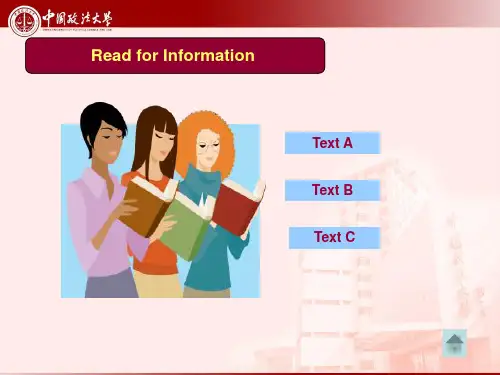
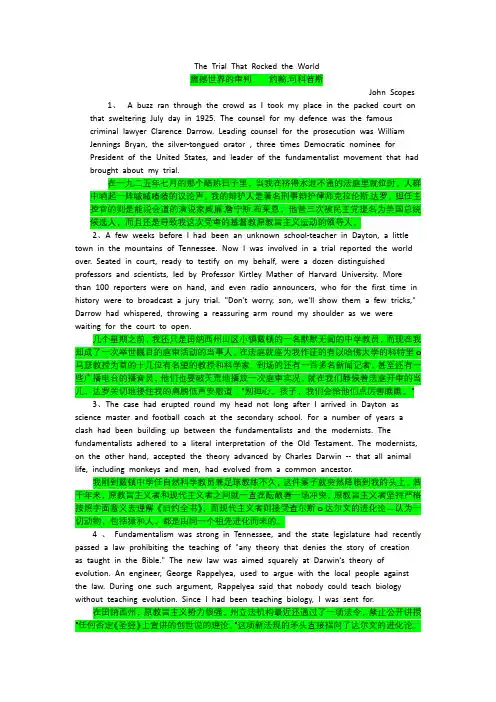
The Trial That Rocked the World震撼世界的审判约翰.司科普斯John Scopes1、A buzz ran through the crowd as I took my place in the packed court onthat sweltering July day in1925.The counsel for my defence was the famouscriminal lawyer Clarence Darrow.Leading counsel for the prosecution was William Jennings Bryan,the silver-tongued orator,three times Democratic nominee forPresident of the United States,and leader of the fundamentalist movement that had brought about my trial.在一九二五年七月的那个酷热日子里,当我在挤得水泄不通的法庭里就位时,人群中响起一阵嘁嘁喳喳的议论声。
我的辩护人是著名刑事辩护律师克拉伦斯.达罗。
担任主控官的则是能说会道的演说家威廉.詹宁斯.布莱恩,他曾三次被民主党提名为美国总统候选人,而且还是导致我这次受审的基督教原教旨主义运动的领导人。
2、A few weeks before I had been an unknown school-teacher in Dayton,a little town in the mountains of Tennessee.Now I was involved in a trial reported the world over.Seated in court,ready to testify on my behalf,were a dozen distinguished professors and scientists,led by Professor Kirtley Mather of Harvard University.More than100reporters were on hand,and even radio announcers,who for the first time in history were to broadcast a jury trial."Don't worry,son,we'll show them a few tricks," Darrow had whispered,throwing a reassuring arm round my shoulder as we were waiting for the court to open.几个星期之前,我还只是田纳西州山区小镇戴顿的一名默默无闻的中学教员,而现在我却成了一次举世瞩目的庭审活动的当事人。
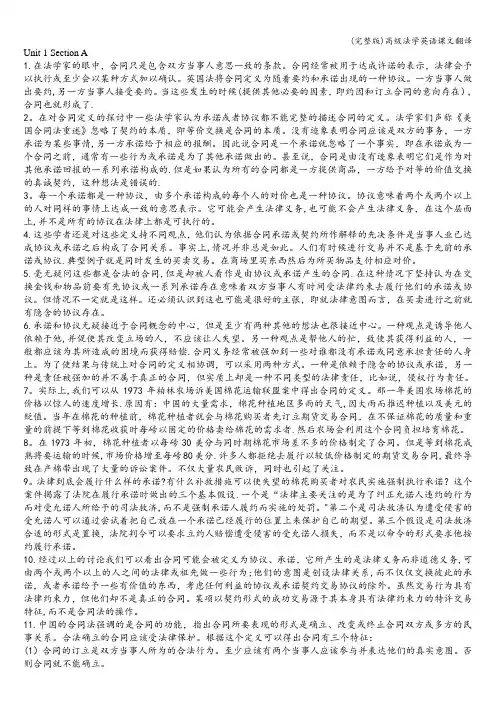
Unit 1 Section A1.在法学家的眼中,合同只是包含双方当事人意思一致的条款。
合同经常被用于达成许诺的表示,法律会予以执行或至少会以某种方式加以确认。
英国法将合同定义为随着要约和承诺出现的一种协议。
一方当事人做出要约,另一方当事人接受要约。
当这些发生的时候(提供其他必要的因素,即约因和订立合同的意向存在),合同也就形成了.2。
在对合同定义的探讨中一些法学家认为承诺或者协议都不能完整的描述合同的定义。
法学家们声称《美国合同法重述》忽略了契约的本质,即等价交换是合同的本质。
没有迹象表明合同应该是双方的事务,一方承诺为某些事情,另一方承诺给予相应的报酬。
因此说合同是一个承诺就忽略了一个事实,即在承诺成为一个合同之前,通常有一些行为或承诺是为了其他承诺做出的。
甚至说,合同是由没有迹象表明它们是作为对其他承诺回报的一系列承诺构成的.但是如果认为所有的合同都是一方提供商品,一方给予对等的价值交换的真诚契约,这种想法是错误的.3。
每一个承诺都是一种协议,由多个承诺构成的每个人的对价也是一种协议。
协议意味着两个或两个以上的人对同样的事情上达成一致的意思表示。
它可能会产生法律义务,也可能不会产生法律义务,在这个层面上,并不是所有的协议在法律上都是可执行的。
4.这些学者还是对这些定义持不同观点,他们认为依据合同承诺或契约所作解释的先决条件是当事人业已达成协议或承诺之后构成了合同关系。
事实上,情况并非总是如此。
人们有时候进行交易并不是基于先前的承诺或协议.典型例子就是同时发生的买卖交易。
在商场里买东西然后为所买物品支付相应对价。
5.毫无疑问这些都是合法的合同,但是却被人看作是由协议或承诺产生的合同.在这种情况下坚持认为在交换金钱和物品前要有先协议或一系列承诺存在意味着双方当事人有时间受法律约束去履行他们的承诺或协议。
但情况不一定就是这样。
还必须认识到这也可能是很好的主张,即就法律意图而言,在买卖进行之前就有隐含的协议存在。
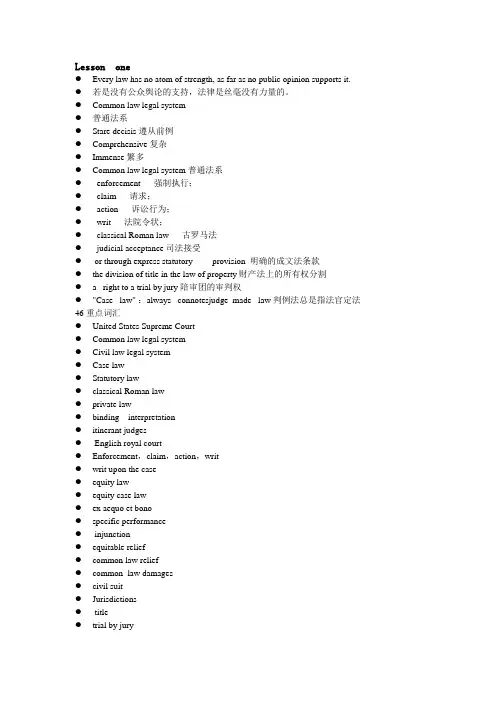
Lesson one●Every law has no atom of strength, as far as no public opinion supports it.●若是没有公众舆论的支持,法律是丝毫没有力量的。
●Common law legal system●普通法系●Stare decisis遵从前例●Comprehensive复杂●Immense繁多●Common law legal system普通法系●enforcement 强制执行;●claim 请求;●action 诉讼行为;●writ 法院令状;●classical Roman law 古罗马法●judicial acceptance司法接受● or through express statutory provision 明确的成文法条款●the division of title in the law of property财产法上的所有权分割● a right to a trial by jury陪审团的审判权●"Case law" :always connotesjudge made law判例法总是指法官定法46重点词汇●United States Supreme Court●Common law legal system●Civil law legal system●Case law●Statutory law●classical Roman law●private law●binding interpretation●itinerant judges● English royal court●Enforcement,claim,action,writ●writ upon the case●equity law●equity case law●ex aequo et bono●specific performance● injunction●equitable relief●common law relief●common law damages●civil suit●Jurisdictions● title●trial by jury●judge-made lawLesson Two●American Bar Association美国律师协会●Lawyers in private practice独立开业的律师●The general counsel (总法律顾问)●An officer of the company公司管理人员●Serve on important policy making committees重要决策委员会●Serve on the board of directors. 董事会●Most to have in their employ persons with legal training非常了解企业的特殊问题和条件●remain members of the bar 保留律师协会会员身份●entitled to appear in court有资格出庭进行诉讼61重点专业词汇●Legal Profession●Multistate Bar Exam●federal courts●boards of directors●Judge●Attorney General●Chief Justice●Barristers●Solicitors●Attorney●practice of law●Lawyers in private practice●single practitioner●house Counsel●corporate counsel●The United States Department of Justice●public prosecutors●Federal prosecutors●district attorneys●Congress of the United StatesLesson Three●As virtually the only way to prepare for membership in the legal profession,●法学院实质上是为法律职业准备人才的唯一途径。
2010 English Qualification TestFor Master-Degree ApplicantsPaper One(90 minutes)Part I Dialogue Communication (10minutes,10points)Section A Dialogue Completion1. A: Can you take over for me here for a little while? I have a friend coming to see me.B. I'd like to, but ______. Ask Peter, he's not so occupied at this moment.A. how can I do it?B. that's alright.C. I have my hands full.D. that's impossible2. A: To get an outside line, just dial o and the phone number. Or we can place a call for you, if youwant.B: No, thanks a lot.________A. Just put me through.B. I'll try it myself.C. I'd rather not.D. I'll appreciate your help.3.A: Now, it's just work, work, work. I work hard all day, every day.B: Oh, come on. _________ You're making a good salary now.A. Don't complain.B. Sorry to hear about itC. Anything I can do for you?D. What's your plan?4.A: Pamela, can you come to a meeting on Friday?B: _______ Let me check my schedule. When are you having it?A. No big deal.B. I'm not sure.C. Can I?D. Sure thing!5. A: I'm really getting fed up with the salespersons who keep calling.B: _________A.I hope it's nothing serious.B. They are so stupid!C. So am I. It's so annoying.D. You are right. Forget it.Section B Dialogue Comprehension6. Man: I've figured it out. It looks like it'll take us about 5 hours to drive from here to Chicago. Woman: It'd be more relaxing to take the train. But I guess we should watch our expenses. Question: What does the woman imply?A. She likes to drive when she travels.B. She doesn't want to go to Chicago.C. She doesn't know the cost of the train trip.D. It's cheaper to go to Chicago by car.7.Man: How about the examination last week?Woman: If I'd got more time, I could have made it.Question: What does the woman imply?A. She was asked to take another examinationB. She failed the examination last week.C. She did quite well in the examination.D. She didn't take the examination last week.8. Man: Harvard or the State University, have you decided yet?Woman: Well, I'd rather be a big fish in a small pond.Question: Which university is the woman likely to choose?A. The State University.B. Harvard.C. Neither.D. She hasn't decided yet.9. Man:I‘ve just found a great location to open a new shop.Women: But yo u haven‘t researched the market. Don‘t you think this is putting the cart beforethe horse?Question: What does the woman mean?A. The man shouldn‘t make the decision so quickly.B. It‘s too risky to choose such a location.C. The man is doing thins in the wrong order.D. It‘s possible for him to make a better choice.10.Women: My results are a bit flattering because I‘ve had quite a lot of luck.Man: Nonsense, you‘re head and shoulders above the others in your groupQuestion:What does the man think is the reason for the woman‘s success?A. She‘s really lucky.B. She‘s far better than the others.C. She‘s got the others‘ support.D. She‘s been working hard.Part II VocabularySection A11. Betty was offended because she felt that her friends had ignored her purposefully at the party.A. desperatelyB. definitelyC. deliberatelyD. decisively12. There has been enough playing around, so let‘s get down to business.A. make a dealB. begin our workC. reach an agreementD. change our plan13. How is it possible for our human body to convert yesterday‘s lunch into today‘s muscle?A. alterB. developC. modifyD. turn14. It is important for families to observe their traditions even as their children get older.A. noticeB. watchC. followD. celebrate15. It is difficult to comprehend, but everything you have ever seen, smelt , heard or felt ismerely your brain‘s interpretation of incoming stimuli.A. explanationB. evaluationC. recognitionD. interruption16.Life is more important than the pressures and stresses that we place on ourselves over work andother commitments.A. appointmentsB. arrangementsC. obligationsD. devotions17. If you continue to indulge in computer games like this, your future will be at stake.A. in dangerB. without questionC. on guardD. at large18. Romantic novels, as opposed to realistic ones, tend to present idealized versions of life ,often with a happy ending .A. in contrast toB. in regard toC. in terms ofD. in light of19. Most people would agree that, although our age far surpasses all previous ages in knowledge ,there has been no correlative increase in wisdom.A. improvesB. precedesC. imposesD. exceeds20. Many students today display a disturbing willingness to choose institutions and careers on the basisof earning potential.A. offensiveB. depressiveC. troublesomeD. tiresomeSection B21. My oldest son had just finished an _______ holiday stay prior to moving to a new state, a new job,and the next chapter in his lift.A. enlargedB. expandedC. extendedD. increased22. Blacks and American Indians _____ less than 10% of students in the top30 business schools, whilethey are about 28% of the U.S population.A. make upB. take upC. reach outD. turn out23.With demand continuing to rise in ______ economies such as China and India, energy tradersbelieve that oil futures are a good bet.A. employingB. emergingC. embracingD. emitting24. Laws and regulations in each country have to be made ______ the constitution of the country.A. in honor ofB. in memory ofC. in return forD. in line with25. The jury‘s______ was that the accused was guilty.A. verdictB. sentenceC. trialD. debate26. In English learning, a ____ cycle occurs when a student makes more errors after being scolded.A. verticalB. viciousC. vividD. vigorous27.Isn‘t it _________ when you learn something you‘ve never known before?A. coolB. crazyC. coldD. cute28.There are several factors ______ the rapid growth of sales promotion, particularly in consumermarkets.A. resorting toB. appealing toC. applying toD. contributing to29. The Internet has been developing at a speed ________ people's expectations in the past two decades.A. overB. ofC. underD. beyond30. It is obvious that the sports games are no longer amateur affairs; the have becomeprofessionally_____.A. laid offB. laid outC. put offD. put outPart III Reading Comprehension (45 minutes, 30 points)Passage OneLoneliness has been linked to depression and other health problems. Now, a study says it can also spread. A friend of a lonely person was 52% more likely to develop feelings of loneliness. And a friend of that friend was 25% more likely to do the same.Earlier findings showed that happiness, fatness and the ability to stop smoking can also grow like infections within social groups. The findings all come from a major health study in the American town of Framingham, Massachusetts.The study began in 1948 to investigate the causes of heart disease. Since then, more tests have been added, including measures of loneliness and depression.The new findings involved more than 5,000 people in the second generation of the Framingham Heart Study. The researchers examined friendship histories and reports of loneliness. The results established a pattern that spread as people reported fewer close friends.For example, loneliness can affect relationships between next-door neighbors. The loneliness spreads as neighbors who were close friends now spend less time together. The study also found that loneliness spreads more easily among women than men.Researchers from the University of Chicago, Harvard and the University of California, San Diego, did the study. The findings appeared last month in the Journal of Personality and Social Psychology.The average person is said to experience feelings of loneliness about 48 days a year. The study found that having a lonely friend can add about 17 days. But every additional friend can decrease loneliness by about 5%, or two and a half days.Lonely people become less and less trusting of others. This makes it more and more difficult for them to make friends---and likely that society will reject them.John Cacioppo at the University of Chicago led the study. He says it is important to recognize anddeal with loneliness. He says people who have been pushed to the edges of society should receive help to repair their social networks.The aim should be to aggressively create what he calls a "protective barrier" against loneliness. This barrier, he says, can keep the whole network from coming apart.31. Besides loneliness, which of the following can also spread among people?A. FriendshipB. HappinessC. DepressionD. Smoking32. The Framingham Heart Study starting from 1948_________.A. expanded its research topicsB. involved 5,000 patients of depressionC. identified loneliness as one key factor for heart diseaseD. examined the relationship between loneliness and depression33. Which of the following is true about the spread of loneliness?A. It leads to a gradual loss of friends.B. It is a common phenomenon among women.C. It is often found in the neighborhood.D. It ruins the relationships between close friends.34. Having a lonely friend, you are more likely to ________.A. strengthen your friendshipB. develop new friendshipC. Increase the sense of lonelinessD. reduce the sense of loneliness35. According to John Cacioppo at the University of Chicago, loneliness can_______.A. result in aggressivenessB. cause people to be overprotectiveC. infect social networksD. push people to the verge of poverty36. What is the main idea of the passage?A. Loneliness can spread.B. Loneliness is linked to depression.C. Lonely people tend to grow fat.D. Lonely people need more friends.Passage TwoCalifornia has a new program called the Digital Textbook Initiative. "Starting this fall with high school math and science, we will be the first state in the nation to provide schools with a state-approved list of digital textbooks." That was Governor Arnold Schwarzenegger in June, talking about his effort to get schools to use materials available free online. He listed reasons why he thinks digital textbooks make sense.California approves traditional textbooks in six-year cycles. Digital ones can offer the latest information. They lighten the load of school bags. They save paper and tress, and make learning more fun and interactive. And above all, he said they help schools with their finances.The state has had to make severe cuts in school spending because of deep financial problems. More than six million students attend California public schools.Earlier this year, California invited content developers to offer digital math and science materialsfor high schools. These had to meet at least 90% of the state's learning requirements. Specially trained teachers examined 16 textbooks and approved ten of them.Six of the ten were published by the CK12 Foundation, a nonprofit group that had been developing digital science and math books for about two years. The foundation paid teachers and other education professionals to write and edit them. The money came from a group financed by the Khosla Family.California cannot require schools to use the digital textbooks. Individual school districts will have to decide for themselves.Susan Martimo, a California Department of Education official, says she does not expect widespread use right away. He best guess is that some schools with a lot of technology will be the first to use them, but only in addition to their traditional books.School administrators point out that the texts may be free online, but students need a way to access them. Not everyone has a computer or electronic reader. Schools could print out copies, but that would not help the environment. Also, there is the cost to train teachers to use digital textbooks effectively.37. The Digital Textbook Initiative _______.A. will probably take effect in six yearsB. covers all the high school subjectsC. has been approved by all statesD. is advocated by California state governor38. The main reason for promoting digital textbooks is toA. help save moneyB. benefit the environmentC. provide interesting materialsD. reduce studen ts‘ heavy burden39. The digital textbooks were approved by ______.A. trained teachersB. content developersC. Khosla FamilyD. Ck12 Foundation40. What is true of CK12Foundation?A. It produced 16 digital textbooks.B. It paid teachers to write digital textbooks.C. It is financed by California state government.D. It makes money through developing digital textbooks.41. According to Susan Martimo, digital textbooks _______.A. are not likely to have a widespread useB. will soon replace traditional onesC. will first be adopted by well-equipped schoolsD. are certain to be approved by school districts42. It can be inferred from the last paragraph that ________.A. schools are reluctant to print out copiesB. the use of digital textbooks is not really freeC. students need to pay for computersD. training teachers to use the textbooks is not efficientPassage ThreeDoctors in Britain are warning of an obesity time bomb, when children who are already overweight grow up . So, what should we do? Exercise more? Eat less? Or both? The government feels it has to take responsibility for this expanding problem. The cheerful Mr. Pickwick, the hero of the novel by Charles Dickens, is seen in illustrations as someone who is plump(胖乎乎的)---and happy . In 18th century paintings beauty is equated with rounded bodies and soft curves. But nowadays being overweight is seen as indicating neither a cheerful character nor beauty but an increased risk of heart disease and stroke. So what do you do? Diet? Not according to Englan d‘s chief medical officer, Sir Liam Donaldson. He says that physical activity is the key for reducing the risks of obesity cancer and heart disease. And the Health Secretary John Reid ever said that being inactive is as serious a risk factor in heart disease as smoking. So, having bought some cross trainers, how much exercise should you do? According to Sir Liam Donaldson, at least 30 minutes of moderate activity five days a week. Is going to the gym the answer? Luckily for those who find treadmills (跑步机) tedious , the Health Development Agency believes that physical activity that fits into people‘s live may be more effective . They suggest taking the stairs rather than the lift, walking up escalators, playing active games with your children, dancing or gardening. And according to a sports psychologist , Professor Biddle , gyms ‗ are not making the nation fit‘, and may even cause harm .There‘s new scientific evidence that too much exercise may actually be bad for you. Scientists at the University of Ulster have found that unaccustomed exercise releases dangerous free radicals that can adversely affect normal function in unfit people. The only people who should push their bodies to that level of exercise on a regular basis are trained athletes. So, should we forget about gyms and follow some experts‘ advice to increase exerci se in our daily life? After all, getting off the bus a stop early and walking the rest of the way can‘t do any harm! One final thought. How come past generations lacked gym facilities but were leaner and fitter than people today?43. This passage is mainly about______.A. how to keep fit and avoid fatnessB. increased risks for overweight peopleC. the dangers of exercise in the gymD. the benefit of a balanced diet44.What does “this expanding problem”(Para.1) refer to ?A. The slow growing up of overweight children.B. The obesity time bomb warned of by doctors.C. Too little exercise and too much diet.D. Neglect of the health issue by the government.45. Why does the author mention Mr. Pi ckwick in Charles Dickens‘ novel?A. He was portrayed in an 18th century painting.B. He is the hero of a world famous novel.C. He suffered from heart disease and stroke.D. He is the image of being plump and happy.46. According to Sir Liam Donaldson, what is the best way to avoid obesity?A. Being on diet.B. Giving up smoking.C. Being as inactive as possible.D. Doing physical activities.47. Which of the following is NOT recommended by the Health Development Agency?A. Walking up escalators, dancing or gardening.B. Going to the gym to walk on treadmills.C. Taking the stairs rather than the lift.D. Playing active games with your children.48. It can be inferred from the last paragraph that _______.A. too much exercise may actually be bad for healthB. experts‘ advice cannot be always followedC. past generations longed for gym facilities we have todayD. moderate daily-life exercise can make us leaner and finerPassage FourA metaphor is a poetic device that deals with comparison. IT compares similar qualities of two dissimilar objects. With a simple metaphor, one object becomes the other: Love is a rose .Although this does not sound like a particularly rich image, a metaphor can communicate so much about a particular image that poets use them more than any other type of figurative language . The reason for this is that poets compose their poetry to express what they are experiencing emotionally at that moment. Consequently, what the poet imagines love to be may or nay no be our perception of love. Therefore, the poet‘s job is to enable us to experience it, to feel it the same way as the poet does.Let‘s analyze this remarkably unsophisticated metaphor concerning love and the rose to see what it offers. Because the poet uses a comparison with a rose, first we must examine the characteristics of that flower. A rose is spectacular in its beauty, its petals(花瓣) are nicely soft, and its smell is pleasing. It‘s possible to say that a rose is actually a feast to the senses of sight, touch, and smell. The rose‘s appearance seems to border on perfection, each petal seemingly symmetrical in form. Isn‘t this the way one‘s love should be? A loved one should be a delight to one‘s senses and seem perfect. However, there is another dimension added to the comparison by using a rose. Roses have thorns. The poet wants to convey the idea that roses can be tricky. So can love, the metaphor tells us. When one reaches out with absolute trust to touch the object of his or her affection, ouch, a thorn can cause great harm! ―Be careful,‖ the metaphor warns: Love is a feast to the senses, but it can overwhelm us, and it can also hurt us and cause acute suffering. This is the poet‘s perception of love--an admonition(劝诫). What is the point? Just this: It took almost14 sentences to clarify what a simple metaphor communicates in only four words! That is the artistry and the joy of the simple metaphor.49. According to the passage, what is a metaphor?A. A comparison between two different objects with similar features.B. A contrast between two different things to create a vivid image.C. A description of two similar objects in a poetic way.D. A literary device specially employed in poetry writing.50. The main idea of this passage is that _______.A. rose is a good image in poetryB. love is sweet and pleasingC. metaphor is ambiguousD. metaphor is great poetic device51. It can be inferred from the passage that a metaphor is __________.A. difficult to understandB. rich in meaningC. not precise enoughD. like a flower52. As is meant by the author, thorns of a rose_________.A. Protect the rose from harmB. Symbolize reduced loveC. Add a new element to the image of loveD. Represent o bjects of one‘s affection53. The meaning of the love-is –a-rose metaphor is that____________.A. love is a true joyB. true love comes once in a lifetimeC. love does not last longD. love is both good and bad experiences54. According to the passage, poetry is intended to___________ .A. release angerB. entertain the readersC. express poets‘ ideasD. reward the sensesPassage FiveSome 23 million additional U.S. residents are expected to become more regular users of the U.S. health care system in the next several years, thanks to the passage of health care reform. Digitizing medical data has been promoted as one way to help the already burdened system manage the surge in patients. But putting people‘s health information in databases and online is going to do more than simply reduce redundancies. It is already shifting the very way we seek and receive health care.―The social dynamics of care are changing,‖ says John Gomez, vice president of Eclipsys, a medical information technology company. Most patients might not yet e willing to share their latest CT scan images over Facebook, he notes, but many parents post their babies‘ ultrasound images, and countless patients nowadays use social networking sites to share information about conditions, treatments and doctors.With greater access to individualized health information—whether that is through a formal electronic medical record, a self-created personal health record or a quick instant-messaging session with a physician-the traditional roles of doctors and patients are undergoing a rapid transition.―For as long as we‘ve known, health care has been ‗I go to the physician, and they tell me what to do, and I do it,‘‖ sa ys Nitu Kashyap, a physician and research fellow at the Yale Center for Medical Informatics. Soon more patients will be arriving at a hospital or doctor‘s office having reviewed their own record, latest test results and recommended articles about their health concerns. And even more individuals will be able to skip that visit altogether, instead sending a text message or e-mail to their care provider or consulting a personal health record or smart-phone application to answer their questions.These changes will be strengthened by the nationwide shift to electronic medical records, which has already begun. Although the majority of U.S. hospitals and doctors' offices are still struggling to start the changeover, many patients already have electronic medical records—and some even have partial access to them. The My Chart program , in use at Cleveland Clinic , the University of Texas Southwestern Medical Center at Dallas and other facilities , is a Web portal (门户) through which patients can see basic medical information as well as some test results.Medical data is getting a new digital life, and it is jump-starting a "fundamental change in how care is provided," Gomez says.55. Which of the following is the best title for this passage?A. The Future of Your Medical DataB. Challenges Against Doctors and HospitalsC. Benefits of the U.S. Health Care ReformD. How to Access and Share Your Health Information56. Putting patient information in databases and online _____.A. enables more Americans to join the health care system.B. contributes to the passage of health care reformC. increases the burden of the U.S. health care systemD. changes how people seek and receive health care57. According to John Gomez, many patients use social networking sites to ______.A. change their social interactionsB. post their latest CT scan imagesC. share information about their health careD. show their babies' recent pictures58. Which of the following is NOT changing the traditional roles of doctors and patients?A. A formal electronic medical record.B. An easier access to information online.C. A self-created to information online.D. A quick instant-messaging session with a doctor.59. According to Nitu Kashyap, more patients in the future will_______.A. refuse to follow their doctors' adviceB. be more dependent on their doctorsC. leave out their visit to doctors' offices and hospitalsD. have their health conditions examined through e-mail60. It is stated in the passage that ________.A. nationwide digitalization of medical data will begin soonB. most of U.S. hospitals and doctors are against the shiftC. patients are worried about the security of their health informationD. patients are starting to make use of their electronic medical recordsPart IV Cloze (15 minutes, 15points,)Are you single but too busy to search for love? Then you need to try the latest dating phenomenon that is sweeping _61_ the UK - speed dating. Speed dating _62_ men and women meeting in a room and finding out as much as they can about possible _63_ in three minutes. It's proving very _64_ with Britain's young people who find that they haven't got the time to meet that special one.At a speed dating event you are given three minutes to talk, _65_, with a member of the opposite sex. Then a bell _66_ rung and you move to another person and start chatting again. By the end of the evening you will have spoken with up to twenty men or women! If, by the end of a conversation, you _67_ the person or would like to see them again, you write it _68_ on a card. Then, if the other person also fancies you, the organizers will contact you with their details. But is three minutes long enough to make an impression and _69_ if you want to see someone again? Research suggests that _70_ can be felt within the first thirty seconds of meeting someone, and that is _71_ speed dating is all about, knowing quickly if you are going to like someone.And what about romance? Is it possible to make a good _72_ in such a short time? _73_, people say you can't hurry love. However, Britain will soon have its first marriage from a speed date. So, if you are on a _74_ to find Mr. or Miss Right, what have you got to lose? _75_, you still go home on your own. But at best, the person of your dreams could be just three minutes away.61 A. off B. across C. over D. through62 A. requires B. inquires C. revolves D. involves63 A. partners B. spouses C. friends D. counterparts64 A. practical B. popular C. favorable D. normal65 A. all in one B. one after one C. one on one D. one and all66 A. knocked B. shaken C. swung D. rung67 A. attract B. enjoy C. chase D. fancy68 A. down B. off C. up D. back69 A. work on B. work out C. work at D. work up70 A. emotion B. sentiment C. chemistry D. attachment71 A. how B. what C. all D. where72 A. conclusion B. reflection C. guess D. judgment73 A. In all B. After all C. Of all D. And all74 A. tour B. route C. direction D. mission75 A. At last B. At first C. At worst D. At endPaper Two (60 minutes)Part I Translation (30 minutes, 20 points)Section AAn ecosystem is a group of animals and plants living in a specific region and interacting with one another and with their physical environment. Ecosystems include physical and chemical components, such as soils, water, and nutrients that support the organisms living there. These organisms may range from large animals to microscopic bacteria. Ecosystems also can be thought of as the interactions among all organisms in a given area; for instance, one species may serve as food for another. People are part of the ecosystems where they live and work. Human activities can harm or destroy local ecosystems unless actions such as land development for housing or businesses are carefully planned to conserve and sustain the ecology of the area.(119)Section B全球化作为一种新的经济和社会发展趋势,给中国带来了机遇,也带来了挑战。
法律英语lesson 1 Wordsjustice n.1. a state of affairs in which conduct or action is both fair and right, given the circumstances. In law, it more specifically refers to the paramount obligation to ensure that all persons are treated fairly. 正义2. judge,esp: a judge of an appellate court or court of last resort (as a supreme court). 法官字根just,juris=law,right(正义)拉丁文jus(=law,right)justify v. 证明为正当;为~辩护(使正确)《-ify=to make》adjust v. 调整;调节;适应;调停(使正确)《ad-=to》unjust a. 不正的;不当的《un-=not》jurisconsult n. 民法学家;法律学家(思考法律的人)《consult=to consider》jurisdiction n. 司法(权);管辖(区域)(陈述法律的事物)《diction=saying》enforce v.to cause to take effect or to be fulfilled. 执行同义词:implement, applyenforcement n. 实施,执行enforceability n. 可执行性enforceable a. 可执行的enforcer n. 实施者,执行者前缀en- = in, into, on, at, near [变化型]em-(从“在中间”之意演变成“进入某种状态使~,使成为~”等,把表示to make之意的名词、形容词变为及物动词。
有关法学的名词解释英语近年来,随着国际交流的不断加强,法学作为一门学科也逐渐受到了广泛的关注。
学习法学的过程中,我们经常会遇到一些专业术语,尤其是在英文文献中。
为了帮助大家更好地理解这些术语,本文将对一些常见的法学名词进行解释。
1. Law法律Law是法学中最基本、最核心的概念之一。
它指的是由国家或社会制定和执行的一套规则,用于维护社会秩序、保护权益,以及调整人们在社会中的行为。
2. Legal法定的Legal是指符合法律规定、合法的。
在法律层面上,合乎法律规定的行为被称为legal action,而不合法的行为则被称为illegal action。
3. Constitution宪法Constitution是指一个国家或组织的最高法律文件,它规定了政府组织结构、公民权利和义务,以及政府与公民之间的关系。
宪法通常具有最高的法律权威,其他法律必须符合宪法的规定。
4. Contract合同Contract是指双方或多方在法律上达成的一种协议,约定了各方的权利和义务。
合同是法律上诉诸的一种重要形式,用于规范商业和个人之间的关系。
5. Tort民事侵权行为Tort是指一种违反法律规定,给他人造成损害的行为。
民事侵权行为是指以疏忽、过失或意图为基础,对个人财产或人身安全造成损害的行为,如肇事车辆驾驶员的责任、医疗事故等。
6. Criminal刑事犯罪的Criminal是指犯罪行为或与犯罪有关的事物。
刑事犯罪是指违反刑法规定,触犯国家法律的行为。
常见的刑事犯罪包括盗窃、杀人、贩毒等。
7. Evidence证据Evidence是指用于证明一个事实或支持一个主张的信息或物品。
在法律中,证据是决定案件真相和法律责任的重要依据。
证据可以是文件、录音、视频、证人证言等。
8. Procedure程序Procedure是指在法律程序中遵循的特定步骤和规则。
法律程序确保了公正和平等的司法处理,包括立案、审理、判决等环节。
9. Jurisdiction司法管辖权Jurisdiction是指法院、法官或其他司法机关在特定领域或特定案件中行使权力的范围。
法律英语书籍及网站一、参考文献1.《新编法学英语教程》(上、下册),谢立新、马庆林、白小兰编著,上海教育出版社2000年版.2.《法律英语阅读》,陈忠诚编著,法律出版社2003年版.3.《法律英语》(第二版),何家弘编, 法律出版社出版2003年版.4.《法律英语核心教程》(共三册),杜金榜、张新红主编,对外经贸大学出版社2002年版。
5.《涉外经济法律英语》,陈庆柏编著,法律出版社1994年版.6.《法律专业英语》,朱义坤著,济南大学出版社1997年版.7.《法学英语》,罗俊明主编,上海外语教育出版社1995年版.8.《法律英语——中英双语法律文书制作》,陶博著、龚柏华编,复旦大学出版社2004年版.9.《法律基础双语教程》,王士如主编,南开大学出版社2002年版. 10.《简明中国法》(英文版),朱羿锟著,法律出版社2003年版.11.《最新法律专业英语——读写全程点拨》,何主宇主编,机悈工业出版社2003年版.12.《涉外法律英语》,李妍主编,外语教学与研究出版社2003年版. 13.《法律英语教程》,赵雁丽主编,西安交通大学出版社2003年版. 14.《英美法导论》,徐震宇主编, 机悈工业出版社出版,2005年版. 15.《法理学基础》(Essential Jurisprudence)(影印本),Austin M Chinhengo 著,武汉大学出版社2004年版.16.《盎格鲁——美利坚法律史》(Historical Introduction to Anglo-American law),Frederick G. Kempin著, 法律出版社2001年版.17.《比较法传统》(Comparative Legal Tradition),Mary A.Glendon, Michael W. Gordon, Paolo G. Carozza著, 法律出版社2004年版. 18.《法理学——法哲学》(Jurisprudence: Legal Philosophy),Surya Prakash Sinha著, 法律出版社2004年版.19.《英国法律体系》(Essential English Legal System)(影印本),Jan McCormick-Watson著,武汉大学出版社2003年版.20.《刑事程序》(Criminal procedure),Jerold H. Israel, Wayne R. Lafave 著,法律出版社1999年版.21.《产品责任》(Products liability),Jerry J. Phillips著,法律出版社1999年版.22.《法律语言学研究》,刘蔚铭著, 中国经济出版社2003年版.23.《法律翻译——从实践出发》,陆文惠主编, 法律出版社2004年版. 24.《英汉法律词典》, 《英汉法律词典》编写组编,法律出版社1985年版. 25.《英汉法律词典》(修订本),陆文惠主编,法律出版社2002年版. 26.《牛津现代法律用语词典》,Bryan A.Garner,法律出版社2003年版.27.《牛津法律大辞典》,David M. Walker等主编,李双元等译, 法律出版社2002年版.28.《英汉——汉英双向法律辞典》,程逸群主编,中国政法大学出版社1999.年版.29.《英汉双向法律词典》,何高大主编,上海交通大学出版社200年版.30.《新汉英法学词典》,余叔通、文嘉主编,法律出版社1998年版.31.Black’s Law Dictionary(8th Ed.), by Bryan A.Garner editor in chief et al.,West Group,2004.32.Anglo-American Legal System(3rd Ed.),by Edgar Brodenheimer et al.,West Group,2001.33.Understanding Law School, by various authors, LexisNexis, 2004.34.American Legal History——Cases and Materials, by Kermit L. Hall,Oxford,1996.35.The Bluebook——A Uniform System of Citation(8th.Ed),compiled bythe editors of the Columbia Law Review, etc., the Harvard LawReview Association,2005.36.The Redbook——A Manual on Legal Style, by Bryan A. Garner, WestGroup,2002.37.Understanding the Law, by Donald L. Carper et al., West PublishingCompany,1991.38.Legal Reasoning, Research, and Writing for International GraduateStudents, by Nadia E. Nedzel, ASPEN Publishers,2004.39.Introduction to the American Legal System,by Enika H. Schulze, P. Michael Jung, and Rebecca P. Adams, Dallas, Texas: PearsonPublications Company, 2000.40.Fundamentals of American Law,by Alan B. Morrison, London: OxfordUniversity Press. 1996.41. Law 101—Everything You Need to Know About the American LegalSystem, by Jay M. Feinman, New York: Oxford University Press.2000.42. American Legal English Using Language in Legal Contexts. DebraS.Lee, Charles Hall, et Marsha Hurley, The University of MichiganPress, 1999.43. Introduction to the Law of the United States, by David S. Clark,Tugrul Ansay, Deventer: Kluwer Law and Taxation Publishers, 1992.二.中外文献导读1.《新编法学英语教程》(上、下册),谢立新、马庆林、白小兰编著,上海教育出版社2000年版.《新编法学英语教程》是为法学各专业学生在修完大学英语后进一步学习基础法学英语知识而编写的,旨在通过这套教材的实践,帮助学生掌握法学英语的基础词汇,了解新的国外法学研究成果并通过教学实践获得运用法学英语的基本技能,形成熟练阅读理解法学文献以及较为严谨的汉译英的能力。
高校硕士研究生专业英语精品教材高级法学英语中南财经政法大学研究生部精品教材研究课题(2012—2014)编写说明《高级法学英语》旨在培养学习者借助已有的基础英语为工具学习法学知识,在法学知识的学习过程中,习得专业语言。
编写原则既遵循语言学习的内在规律性,又充分体现法学知识的专业特点,重在提高法学硕士研究生的专业英语思辨能力。
课文取材不再是一般法学知识的简要陈述,而是以问题研究为导向的深入探讨。
语料源于英美学者2012年以来发表的论文或出版的著作。
全书共十个单元。
单元课文阅读量为5000英文单词。
每单元由课文、生词、注解、练习和法律英语汉译技巧组成。
单元课文是由三篇各1500字左右的文章组成一个内容完整、主题突出的统一体,以有利于学习者贯通知识,进一步深入分析探讨。
课文内容包括普通法系与大陆法系的比较、合同与准合同、商人法与商法、欧洲统一销售法、国际环境法、公平招聘法律问题、跨国离婚法律问题、有子女的父母犯罪量刑问题、英格兰与苏格兰刑事拘留问题、美国法学教育与改革等专题。
法学英语翻译技巧包括基本翻译技巧----加注、增补、省略、转换、切分、合并,以及句子翻译技巧----名词从句的翻译、状语从句的翻译、定语从句的翻译和长句的翻译。
单元练习包括阅读理解问题、词汇练习、短文翻译和课文概要写作。
本教程设计阅读总量为50000英文单词,生词概率为2%,适合大学英语四级水平以上且有相当法学基础的学习者使用。
CONTENTSUNIT ONE CONTRACT LAWSection A Understanding of ContractSection B Mistake in ContractSection C Quasi-ContractSection D Translation Skill: AnnotationUNIT TWO LITIGATING MARITAL PROPERTY AND SUPPORT RIGHTS FOR INTERNATIONAL DIVORCESection A Jurisdiction and Procedure in International Divorce LitigationSection B Defining Property and support rightsSection C Recognizing and Enforcing Marital Property and Support OrdersSection D Translation Skill: AmplificationUNIT THREE A FAMILY LAW PERSPECTIVE ON PARENTAL INCARCERATIONSection A Family Law and Child DevelopmentSection B Approaches to Consideration of Children’s InterestsSection C Proposal for Consideration of Children’s Interests When Sentencing Parents Section D Translation Skill: OmissionUNIT FOUR FAIRNESS AND INEQUALIT IN EMPLOYMENT DISCRIMINATION LITIGATION Section A How People Assess Legal Fairness: Toward an Analysis of Situated Justice Section B Employment Civil RightsSection C Toward Understanding Situated JusticeSection D Translation Skill: Shift of PerspectiveUNIT FIVE LAW MERCHANTSection A Foundations of the Law MerchantSection B The Law in Law MerchantSection C Twenty-first-century Law MerchantSection D Translation Skill: DivisionUNIT SIX COMMOM EUROPEAN SALES LAWSection A The Substantive Scope of the CESLSection B Possible Routes for Members to Reach the AgreementSection C Further Questions from the Proposal within the FrameworkSection D Translation Skill: CombinationUNIT SEVEN A NEW DAWN FOR SCOTTISH CRIMINAL PROCEDURESection A Arrest, Custody and Police PowersSection B Access to Legal AssistanceSection C Requirement for CorroborationSection D Translation Skill: Translation of Noun ClauseUNIT EIGHT INTERNATIONAL LAW OF ENVIROMENTAL IMPACTASSESSMENT AND THE ESPOO CONVENTIONSection A The Obligation to EIASection B Content of an EIASection C Challenging an EIA: Judicial ReviewSection D Translation Skill: Translation of Adverbial ClauseUNIT NINE THE EFFICIENCY OF THE COMMON LAW: THE PUZZLE OF MIXED LEGAL FAMILIES Section A The history of the common lawSection B Mixed Jurisdictions and Mixed Legal FamiliesSection C THE Economic ModelSection D Translation Skill: Translation of Attributive ClauseUNIT TEN AMERICAN LAW SCHOOL EDUCATIONSection A History of Legal EducationSection B Law School RankingsSection C Law School Education ReformSection D Translation Skill: Translation of Long ClauseAppendix Key to the ExerciseUNIT ONECONTRACT LAWSection AUnderstanding of Contract1 In the eyes of lawyers the word “contract” is used in common speech, simply to refer to a writing containing terms on which the parties have agreed. “Contract” is often used in a more technical sense to mean a promise, or a set of promises, that the law will enforce or at least recognize in some way. British law defines contract as an agreement arising from offer and acceptance. One party makes an offer, and another party accepts that offer. When this has happened (provided that other necessary factors, namely, consideration and intention to contract, are present) there is a contract.2 In arguing the definition of contract some jurisprudents think neither promise nor agreement is completely satisfactory as a basis for the definition. They claim that the definition of the American Restatement ignores the bargain—the exchange of equivalents which is the essence of a contract. No indication is made in the definition that the typical contract is a two-sided affair, something being promised or done on one side in return for something being promised or done on the other side. Thus to say that a contract can simply be “a promise” is to overlook the fact that there is ge nerally some act or promise given in return for the other promise before that promise becomes a contract. Even to say that a contract may consist of “a set of promises” gives no indication that some of these promises are usually given in return for someothers. But it would be wrong to assume that all contracts are genuine bargains in which something is offered on one side for something else of equivalent value on the other.3 Every promise is an agreement and every set of promises forming the consideration for each other is also an agreement. Agreement implies two or more persons who agree upon the same thing in the same sense. It may create legal obligation or it may not create legal obligation and in this sense not every agreement can become enforceable at law.4 These scholars also argue that all the definitions in terms of promises or agreements presuppose that people only enter into contractual relations after they have made some agreement or promise. In fact, this is not always the case. People sometimes simply enter into transactions or relations which are not really based on prior agreements or promises. One obvious example is that of the simultaneous exchange, or sale. A person who buys goods in a supermarket and pays cash for them is exchanging his money for the goods that he buys.5 There is no doubt at all that this is a legal contract, but it is artificial to regard it as a contract created by agreement or promise. To insist that there must be a prior agreement or a set of promises in such a case is to imply that there is a moment of time—before the handing over of the goods and the money—in which the parties are legally bound to perform their agreement or promises. But it seems very doubtful whether that is the case. Still it must be recognized that it might be very well argued that “in contemplation of law” there is an implied agreement before the actual exchange of goods for money.6 Promises and agreements undoubtedly lie close to the center of the concept of contract, but there are at least two other ideas which also lie very close to that center. One is that a person who induces another to rely upon him and change his position, ought not to let that person down, and the other is that a person who does a service to another or renders him some benefit, ought generally to be recompensed for his trouble. Contractual obligations are often imposed for one or other of these reasons on persons who have not really promised or agreed to bear them. In order to reconcilethis result with traditional definitions of contract, two devices are often employed. One is to rely on the concept of an “implied agreement” or “implied promise”;the other is to argue that the liability being imposed is not “truly” contractual but is in facta legal liability of a different kind,for instance,a liability in tort.7 In practice, people can gather some idea of what the word “contract” means fro m the cases in Bolin Farms v. American Cotton Shippers Ass’n (1973). That year saw a spectacular rise in the price of cotton on the American market. The causes were said to include large shipments to China, high water and flood conditions in the cotton belt, late plantings forced by heavy rains, and the devaluation of the dollar. In the early months of the year, before planting, a cotton farmer will make a “forward” sale contract for delivery to the buyer of all cotton to be raised and harvested on a specified tract at a fixed price per pound, without guarantee of quantity or quality. The farmer can then use this contract to finance the raising of his crop.8 Early in 1973, cotton farmers made such contracts to sell at a price roughly equal to the price on the market at that time, some 30 cents a pound. By the time the cotton had been raised and was ready for delivery, however, the market price had risen to about 80 cents a pound. Many refused to perform the “forward” contracts that they had made at the lower price, and scores of lawsuits resulted throughout the cotton belt. Not only were the farmers universally unsuccessful, but the decisions evoked little attention.9 What promises will the law enforce? What remedies were available to the disappoint ed cotton buyers on the farmers’ enforceable promises?The cases here expose three fundamental assumptions made by courts in enforcing promises. One of these is that “law is concerned mainly with relief of promisees to redress breach and not with punishment of promisors to compel performance.” A second assumption is that the relief granted to the aggrieved promisee should generally protect the promisee’s expectation by attempting to put the promisee in the position in which it would have been had the promise been performed. A third assumption is that the appropriate form of relief is substitutional, in the form of a judgment awarding money damages to be paid to the aggrieved promisee, rather than specific, in the form of acourt order directing the promisor to perform its promise.10 After the above discussion we come to know the “Contract” may be defined as an agreement, a promise or a set of promises, which create legal liabilities rather than moral obligations, enforceable by the law between two or more persons to do or forebear from doing some act or acts;their intentions being to create legal relations and not merely to exchange mutual promises, both having given something, or having promised to give something of value as consideration for any benefit derived from the agreement or the promise except a transaction agreement by deed. Although transactions by deed are legally binding they are not true contracts at all. A transaction by deed derives its legally binding quality from the special way in which it is made rather than from the operation of the contract law.11 The definition of contract in the Chinese contract law stresses its functions, saying that a contract is the manifestation of intention to establish, change or terminate the civil relationship between two or more parties. Lawfully established contract shall be protected by law. According to this definition a contract is of three features:(1) Making a contract is a civil juristic act done by both sides. At least two parties shall enter, and express their genuine intention. Otherwise a contract cannot be established.(2) The purpose to make a contract is to bring out a certain civil juristic effect, including establishing, changing or terminating the civil relationship between the two parties.(3) Making a contract is a legal act rather than illegal act. Unlawfully established contracts are null or void.12 In some continental countries, for example, in Germany, the BGB uses an abstract concept of Rechtegcsehaft, putting contract into a category of legal act which covers intention of the two parties and some other certain lawful conducts. This intention is viewed as an essential requirement to form a contract, therefore, the two parties can not establish a contract if they do not manifest it to each other. In the French Civil Code there is a more specific concept of Consensus than that of legal act.Consensus here means the genuine intention of the two parties. Without manifestation of the intention a contract cannot be concluded.(1488words)New Words and Proper Termsoffer n. 邀约,发价acceptance n. 接受,承诺devaluation n. 货币贬值court order 法庭判令consideration n. 对价,约因forbearance n. 克制,抑制constitute v. 构成recompense vt. 赔偿;酬谢Rechtsgeschaefte (德语)法律行为,合法交易consensus n. 合意equivalent value 对等的价值simultaneous exchange 同时发生的交易contemplation of law 法律意图forward contract 期货合同Notes1. law is concerned mainly with relief of promises to redress breach and not with punishment of promisors to compel performance. 法律主要关注的是为了纠正允诺人违约的行为而对受允诺人所给予的司法救济,而不是强制承诺人履约而实施的处罚。